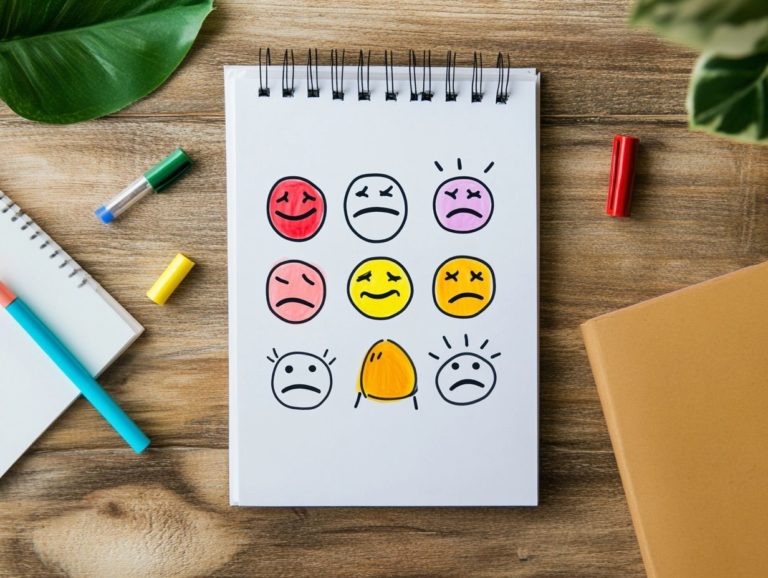5 Inspirational Quotes on Emotional Awareness
Emotional awareness is pivotal in your journey of personal growth, social-emotional learning, and in nurturing your relationships. It shapes the way you navigate the complexities of life s challenges and emotional messages.
Consider five insightful motivational quotes that illuminate the importance of understanding your emotions as well as those of others. Cultivating this awareness can significantly enhance your self-knowledge, enrich your interactions, and empower you to manage stress more effectively.
Dive into the myriad benefits of being emotionally attuned while also recognizing the barriers, such as self-doubt and emotional pain, that may hinder your development of this essential skill.
Contents
- Key Takeaways:
- 1. “The greatest weapon against stress is our ability to choose one thought over another.” – William James
- 2. “Emotional intelligence is the ability to recognize, understand, and manage our own emotions, as well as the emotions of others.” – Daniel Goleman
- Understanding the Importance of Emotional Awareness
- 3. “The more you know yourself, the more patience you have for what you see in others.” – Erik Erikson
- 4. “Emotional awareness is necessary so you can properly assess your own needs and communicate them effectively to others.” – Jessica Moore
- 5. “Being aware of your emotions and learning how to manage them effectively can lead to healthier relationships and a more fulfilling life.” – Unknown
- Why Is Emotional Awareness Important for Personal Growth and Personal Development?
- How Can Emotional Awareness Help in Difficult Situations?
- What Are Some Common Barriers to Emotional Awareness?
- Frequently Asked Questions
- What are some inspirational quotes on emotional awareness?
Key Takeaways:

- Emotions are a powerful force, but we have the ability to choose how we respond to them. Embracing a positive mindset helps in this process.
- Emotional intelligence is not just about understanding ourselves, but also being aware of others’ emotions, fostering empathetic relationships.
- Self-awareness leads to patience and understanding towards others and is critical for personal transformation.
1. “The greatest weapon against stress is our ability to choose one thought over another.” – William James
William James insightfully pointed out that “the greatest weapon against stress is our ability to choose one thought over another.” This underscores the vital importance of taking charge of your thoughts in overcoming emotional hurdles and building resilience.
This perspective gives you the power to enhance your emotional intelligence, equipping you to navigate the intricate landscape of personal growth and mental well-being.
By adopting a proactive mindset, you can significantly shape your emotional landscape, turning potential stressors into valuable opportunities for learning and development. This approach paves the way for actionable steps toward happiness, such as engaging in mindfulness practices, keeping a gratitude journal, and setting realistic goals.
Incorporating powerful coping strategies like deep breathing exercises, regular physical activity, and positive affirmations into your daily routine can serve as a protective buffer against life’s pressures. As motivational author Louise Hay wisely stated, “You have the power to heal your life, and you need to know that.” These strategies enhance your emotional strength and resilience.
This conviction in self-care and emotional resilience is essential for transforming negative stress into constructive energy, empowering you in your self-empowerment journey.
2. “Emotional intelligence is the ability to recognize, understand, and manage our own emotions, as well as the emotions of others.” – Daniel Goleman
According to Daniel Goleman, “emotional intelligence is the ability to recognize, understand, and manage our own emotions, as well as the emotions of others.” This fundamental skill fosters emotional awareness and enhances relationships through compassion and empathy.
Understanding this concept is essential for your personal growth, as it provides you with the tools necessary to navigate your emotional landscape effectively.
By developing your emotional competence, you can handle stress more adeptly, communicate with clarity, and forge deeper emotional connections with those around you.
Engaging in techniques such as mindfulness, reflective journaling, and active listening can significantly elevate your emotional awareness. Consider the examples set by leaders like Oprah Winfrey and Nelson Mandela, who embodied high emotional intelligence. Their remarkable ability to demonstrate empathy and understanding allowed them to inspire and unite people across various divides.
By recognizing and validating the emotions of others, they didn’t just strengthen their relationships; they also fostered a more collaborative and harmonious environment.
Understanding the Importance of Emotional Awareness
3. “The more you know yourself, the more patience you have for what you see in others.” – Erik Erikson
Erik Erikson once remarked, “The more you know yourself, the more patience you have for what you see in others.” This insight shows how crucial self-awareness is for developing patience and emotional connections.
Self-awareness goes beyond simply recognizing your thoughts and emotions. It opens the door to understanding the motivations and behavioral patterns that shape your interactions with others. When you become attuned to your own triggers and responses, you often discover that this insight leads to greater self-acceptance, essential for nurturing healthy relationships.
For example, if you recognize your struggle with vulnerability, you may choose to express your feelings rather than bottling them up. This decision creates a safe space for others to reciprocate, paving the way for meaningful emotional exchanges. Such interactions can catalyze emotional healing, allowing your relationships to deepen as you learn to navigate conflict with empathy.
Personal growth thrives when you embrace self-awareness. It encourages reflection and an openness to change, equipping you to face challenges with resilience and strengthening your connections with those around you.
4. “Emotional awareness is necessary so you can properly assess your own needs and communicate them effectively to others.” – Jessica Moore

Jessica Moore aptly notes that “emotional awareness is necessary so you can properly assess your own needs and communicate them effectively to others,” highlighting the important link between emotional regulation and strong communication skills that empower you to advocate for yourself.
This connection is especially crucial in your relationships. The ability to recognize and articulate your feelings can significantly enhance understanding and cooperation.
For instance, when you feel anxious in social situations, acknowledging that emotion can lead to more meaningful interactions rather than retreating into silence.
To cultivate emotional regulation, consider practices like mindfulness meditation or journaling to reflect on your emotions. Additionally, using assertive communication techniques, such as “I” statements, can promote a clearer expression of your needs and enhance your communication skills.
These strategies not only support your self-advocacy but also foster an environment that encourages open dialogue, essential for nurturing healthy relationships.
5. “Being aware of your emotions and learning how to manage them effectively can lead to healthier relationships and a more fulfilling life.” – Unknown
The insightful statement that “being aware of your emotions and learning how to manage them effectively can lead to healthier relationships and a more fulfilling life” captures the remarkable potential of emotional awareness in driving personal transformation.
When you actively engage with your feelings, you lay the groundwork for deeper, more meaningful connections with others. By recognizing your emotional triggers and understanding how your reactions influence your interactions, you can enhance communication and cultivate empathy two essential ingredients for nurturing strong bonds.
To refine your emotional regulation, consider practical approaches such as practicing mindfulness, journaling your thoughts, or seeking professional guidance. Remember, “The only journey is the one within” a reminder to explore your inner landscape and build inner strength.
By embracing happiness-driven actions like volunteering or immersing yourself in hobbies, you can reshape your emotional environment, resulting in a greater sense of joy and satisfaction in your everyday life, supporting both mental health and self-compassion.
Why Is Emotional Awareness Important for Personal Growth and Personal Development?
Emotional awareness is paramount for your personal growth and personal development. It empowers you to recognize your feelings, fostering emotional intelligence that bolsters resilience and self-belief two essential traits for lifelong learning and gracefully navigating life s challenges.
When you become attuned to your emotions, you gain profound insight into your own reactions. You also nurture empathy for others, creating a more harmonious environment conducive to growth. This enhanced awareness of your emotional states leads to better decision-making, stronger character, and strengthens relationships vital components of both personal and professional success.
As you cultivate resilience by understanding your emotional landscape, you become more adaptable to change. This significantly enhances your ability to face obstacles. Ultimately, this journey of emotional exploration lays a robust foundation for continuous self-improvement and the pursuit of meaningful goals. It illustrates the importance of embracing change as a pathway to realizing your aspirations and achieving positive change.
How Can One Develop Emotional Awareness and Embrace Growth?
Developing emotional awareness requires you to engage in self-reflection while honing practical emotional intelligence skills, which is the ability to understand and manage your emotions and the emotions of others. This is supported by coping strategies that foster personal growth through self-reflection and a deeper understanding of your feelings, enhancing your personal responsibility.
Incorporating techniques like journaling can be incredibly beneficial in processing complex emotions. It allows you to articulate thoughts and feelings that might otherwise linger unexamined in the back of your mind. Mindfulness practices play a significant role in this journey as well. They promote a heightened awareness of the present moment, enabling you to observe your emotional responses without rushing to judge them. This practice helps reduce mental health stigma.
Active listening is another powerful tool in your arsenal. It fosters connections with others by cultivating empathy and appreciating diverse perspectives. When combined, these strategies not only nurture your emotional awareness but also serve as essential components of personal development.
They give you the power to navigate life’s challenges with increased resilience and insight.
What Are the Benefits of Being Emotionally Aware?

Being emotionally aware comes with a wealth of benefits that can elevate your life think improved relationships, enhanced emotional regulation, and a deepened sense of self-acceptance! All of these elements are essential for integrating effective happiness practices into your daily routine.
When you cultivate emotional awareness, you gain a richer understanding of your feelings. This sets the stage for healthier communication and stronger connections with those around you. This self-awareness enables you to identify emotional triggers, allowing you to respond thoughtfully instead of reacting on impulse. As a result, your relationships grow more resilient, creating a space where both you and others feel valued and understood.
Enhanced emotional regulation is key to self-acceptance, allowing you to embrace your vulnerabilities and imperfections. This acceptance paves the way for a positive mindset, giving you the power to take intentional steps toward happiness, such as practicing gratitude and engaging in activities that bring you fulfillment.
Start journaling today to improve your emotional awareness! Embrace mindfulness; take a moment each day to reflect on your feelings.
How Can Emotional Awareness Help in Difficult Situations?
Emotional awareness can be your greatest ally in navigating difficult situations. It enhances your problem-solving skills, fosters emotional strength, and builds the resilience needed to effectively manage life’s challenges.
As you cultivate this awareness, you become more attuned not just to your own feelings but also to the emotions of those around you. This heightened sensitivity allows you to approach setbacks with a balanced perspective, leading to clearer thinking and better decision-making when the pressure is on. Recognizing and addressing your emotional responses can prevent overwhelming stress from clouding your judgment. This practice aids in resolving immediate conflicts and helps you maintain a positive outlook, which is essential as you confront future adversities.
In essence, the ability to understand and regulate your emotions lays a solid foundation for overcoming obstacles and emerging even stronger from challenging experiences.
What Are Some Common Barriers to Emotional Awareness?
Common barriers to emotional awareness include emotional pain, self-doubt, and the stigma associated with mental health. These obstacles can significantly hinder your ability to advocate for yourself and embark on a journey of emotional healing.
These challenges often create a vicious cycle where the avoidance of emotional discomfort escalates, leading to increased isolation and a worsening of your issues. Emotional pain may manifest as an unwillingness to confront deep-seated feelings. At the same time, self-doubt can cloud your self-perception, making it difficult to recognize your inherent worth.
The pervasive stigma surrounding mental health can discourage you from seeking help or discussing your struggles, intensifying feelings of shame. Creating a supportive environment is crucial! Practice self-compassion and gradually confront and articulate your feelings in a safe space. This approach can ultimately lead you to profound self-acceptance and emotional resilience.
Frequently Asked Questions
What are some inspirational quotes on emotional awareness?

1. “Emotions are like waves, we can’t stop them from coming, but we can choose which ones to surf.” – Jonatan M rtensson
2. “The more you understand yourself, the more silence there is, the healthier you are.” – Maxime Lagac
3. “Being aware of your emotions is the first step to managing them.” – Unknown
4. “Emotional intelligence is not the absence of emotions, but the ability to understand and manage them.” – Unknown
5. “Your emotions are the slaves to your thoughts, and you are the slave to your emotions.” – Elizabeth Gilbert
How can inspirational quotes help with emotional awareness?
Inspirational quotes can help by providing perspective, insight, and motivation to become more aware of our emotions. They can also serve as daily reminders to practice emotional awareness and management.
Why is emotional awareness important?
Emotional awareness allows us to understand and manage our emotions better. This leads to healthier relationships, improved communication, and overall well-being. Additionally, it helps us identify and address any underlying issues that may be causing certain emotions.
What are some practical ways to improve emotional awareness?
- Practice mindfulness and self-reflection regularly.
- Pay attention to physical sensations that arise with different emotions.
- Keep a journal to track and identify patterns in your emotions.
- Seek therapy or counseling to work through any unresolved emotional issues.
- Surround yourself with emotionally intelligent and supportive individuals.
How can emotional intelligence impact our daily lives?
Emotional intelligence, including emotional awareness, can positively impact our daily lives. It improves our relationships, communication skills, and decision-making abilities. It can also help us navigate through challenging situations and manage stress more effectively.
Start your journey towards greater emotional awareness today!
What are some signs of low emotional awareness?
Signs to Recognize
Recognizing these signs is crucial! Some signs of low emotional awareness include difficulty identifying and expressing emotions and impulsive behavior.
People with low emotional awareness often use unhealthy coping methods. These can include avoidance or aggression.






